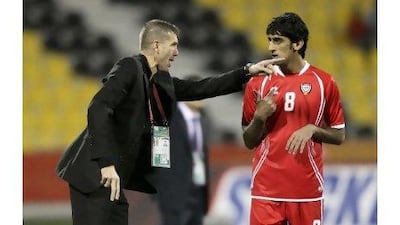A few days before he was to leave the country, Srecko Katanec took an unusual conversational detour, given his new status as the former coach of the national football team: the Slovenian spoke fondly of his two years here and his work with the Football Association(FA) and Mohammed Khalfan Al Rumaithi, the FA president.
"I wish for them the best," Katanec said. "I know that in this next game they will be 100 per cent better than in the last two.
"So, one more time I would like to thank the president and everybody. I was grateful to coach in the UAE. I think we also did some improvements."
As the chat progressed, Katanec never got around to adding another verse to the lament of ex-coaches, certainly not a scalding stanza of the sort authored by Roy Hodgson after he was dismissed by the FA in 2004. (The Englishman suggested that Emirati players were "lazy" but generously denied that they were "uncoachable" as "many say".)
If anything, Katanec's graceful exit would seem to give him added credibility on the topic of how the national team can move forward. This is not a football man who has been grinding axes.
The side return to 2014 World Cup qualifying tomorrow, away to South Korea, a difficult game under any circumstances but now a desperate one, too, following the defeats to Kuwait and Lebanon last month that left the UAE in a hole and Katanec without a job.
He is most concerned with the development of the several young players introduced into the national side during his tenure.
He hopes that fans and media come to appreciate the differences between the successes of the Under 23 team and the struggles of the senior side - despite the presence of several players in both camps.
The Under 23 players, who look so promising under Mahdi Ali, cannot be expected to shift seamlessly into the crucible of senior team competition.
Anyone who has watched youngsters dominate Olympic-level competition and then disappear in a World Cup qualifier should grasp the difference, but Katanec found such was not the case. "It is completely differenct football," he said. "A match against boys is not the same as same as a match against men."
He also urges patience and more patience with the young guys. "They will still do many mistakes but they are the future," he said.
He revisited the issue of the frustrating relationship between the Pro League and the national side. "Club versus country" tensions are nearly universal in global football, but he made two observations peculiar to this country.
The first is the absence of Emiratis playing abroad, in leagues with deeper talent and more challenging in-squad competition. He believes that several players from the national side have the ability to play internationally, and should. Whatever the reasons for Emiratis staying at home, it stunts the national team's development.
The second is the lack of Emiratis in attacking positions with domestic clubs, which seems more dire year by year. Ismail Matar is the only forward in the national team who can count on playing with his club's first team.
Katanec noted how, in the Lebanon game, with injuries having further diminished the side's cutting edge, he had no choice but to turn to Pro League fringe players.
He also would advise more emphasis on player fitness. He is among the modernists who believe that quick and whippet-lean players of the Barcelona sort are now most likely to succeed.
His closest flirtation with self-pity, comparing public reaction to club defeats to national team defeats, is nonetheless valid. "Jazira loses 5-1 to a club in Iran and everyone says, 'These things happen.' But when the national team are playing it's a disaster to lose to Iran," he said.
Katanec was never going to be a loveable figure. He can be abrasive and impatient; he hasn't yet heard a question he cannot interrupt. More than one pundit described him as "arrogant".
A sort of Austro-Hungarian reserve might explain any perceived aloofness and, if it does not, having played in the Bundesliga and Seria A and coached Slovenia into the 2002 World Cup would seem to excuse a bit of self-regard.
Now he returns to Europe, his time over, his doom sealed over a five-day period last month. But no hard feelings.
"I am good. This is the coaching life," he said.
"But, anyway, I think in the UAE are some good players who can make a good group. I see a good future, but without more work it's nothing."

